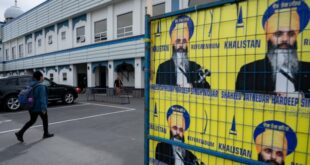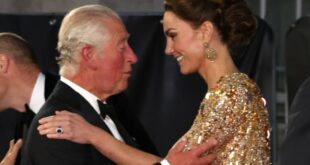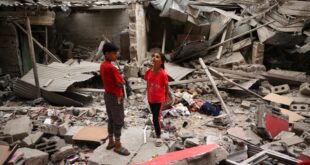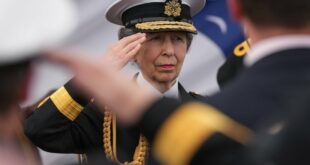Dure Ahmed appeared in Brampton, Ont., court Monday on terrorism peace bond
This story is a co-production between CBC and BBC and is part of Bloodlines, a podcast series co-produced by CBC Podcasts and BBC Sounds about the children of ISIS fighters left behind when the West defeated the militants. The first episode will be available Oct. 23. Subscribe to the series here.
A Canadian woman whose marriage to a notorious ISIS fighter is being made public for the first time says she was "oblivious to what was going on" when she lived with him in Syria.
In an interview with CBC and U.K. public broadcaster BBC in Toronto last week, Dure Ahmed, 33, said she was unaware of the atrocities being committed by her then-husband El Shafee Elsheikh, who was part of a cell within ISIS linked to the abduction, torture and beheading of Western hostages.
"It's like I was oblivious to what was going on," she said.
She said she accepts that her time with Elsheikh was part of her life, "whether I like it or not."
In a Brampton, Ont. courtroom on Monday, a Crown lawyer argued Ahmed had been "steeped" in ISIS ideology and it would have been "likely" she knew of her husband's role with the group before leaving Canada.

Details introduced at peace bond hearing
Ahmed, who was born in Canada to Ethiopian parents, travelled from Canada to join the British-born Elsheikh in Syria in 2014. She says she wasn't radicalized but was just "a dumb girl in love."
After the defeat of ISIS, also known as the Islamic State, in Syria in 2019, she ended up in a Kurdish-controlled camp in northern Syria for the wives and children of suspected ISIS militants. In April of this year, Ahmed and her two sons were among a group of women and children repatriated to Canada.
When she returned to Canada, Ahmed was immediately arrested on a "terrorism peace bond" and later granted bail with conditions.
On Monday, the details of her case — including whom she was married to — were made public for the first time in a peace bond hearing.
Dure's lawyer did not contest the conditions suggested for her terrorism peace bond.
The Crown and Ahmed's legal team put forward a joint proposal with conditions that would include her being monitored by GPS and subjected to a curfew between the hours of 10 p.m. and 6 a.m. ET. The judge said he would deliver his ruling on Oct. 19.
'I'm not looking for sympathy'
Ahmed said she expects a backlash for speaking publicly but wants to highlight the plight of the women and children of suspected ISIS fighters still stuck in Syrian camps.
"I'm not looking for sympathy or pity," she said.
Elsheikh and the others in his ISIS cell were nicknamed "the Beatles" by their captives because of their British accents. The men were responsible for the deaths of several hostages — most of whom were beheaded — and filmed the killings and posted the videos on social media in 2014 and 2015.
U.S. prosecutors said Elsheikh's actions resulted in the deaths of four Americans: journalists James Foley and Steven Sotloff and aid workers Kayla Mueller and Peter Kassig. They said he also conspired in the deaths of two British aid workers, David Haines and Alan Henning, as well as Japanese journalists Haruna Yukawa and Kenji Goto.
Their bodies have never been found.
Elsheikh, who is from west London, is now serving eight life sentences in a U.S. prison. The U.K. stripped him of his citizenship before his conviction.

Didn't know husband had joined ISIS
Ahmed claims Elsheikh had not told her he had joined ISIS before she left Canada to be with him. She insists she was unaware of ISIS's ideology when she arrived in Syria.
When she got to Syria, she says, she barely recognized the controlling and violent figure Elsheikh had become.
Ahmed joined her husband in Syria just after ISIS had shocked the world by committing numerous atrocities while seizing the northern Iraqi city of Mosul and after starting a genocide against Iraq's Yazidi religious minority.
- Subscribe to Bloodlines, from CBC Podcasts and BBC Sounds
CBC and BBC interviewed Dure Ahmed twice, most recently in Toronto last week, where she spoke more freely. The first meeting, however, was in the detention camp in Syria in November 2022, where she had offered to speak about a missing British child whose story is included in an upcoming podcast series co-produced by CBC and the BBC.
At first, the journalists had no idea of her husband's identity, only learning about it later in their investigation.

Repatriated Canadian woman was married to notorious ISIS fighter, court confirms
Featured VideoA repatriated Canadian woman with ties to ISIS was married to a notorious fighter who is now in a U.S. prison for his role in the executions of four American hostages. Dure Ahmed has not been charged with a crime but her presence in Canada worries some who lost family members to the Islamic State.
Ahmed said she and Elsheikh met in Toronto in 2007, when she was 17 and he was 19. The journalists asked how they had first connected as teenagers in Canada.
"Smoking weed," Ahmed said with a laugh. "He didn't care about God. It was nothing to do with IS."
The pair kept in touch when Elsheikh, the son of Sudanese refugees, returned to London. In 2010, they were married in an Islamic ceremony, but the relationship remained largely long distance, as Ahmed stayed in Toronto where she was studying for an English degree.
According to Ahmed as well as testimony provided in the U.S. trial, Elsheikh became drawn to extremism and met the men who would become his fellow militants in ISIS in west London.
"He wasn't a social person," Ahmed said. "He's such an introvert. So he had all the qualities that can lead somebody into that dark path of radicalization."

'Not knowing was better than knowing'
In 2012, Elsheikh travelled to Syria to fight in the country's civil war. He joined ISIS a year later and spent the next two years encouraging his wife to join him.
"'Come check it out. You could go back.' As if it was so simple," she said.
Elsheikh had refused to give her details of what he was doing in Syria. She said she didn't even know which city he was living in.
"For the most part, I thought that not knowing was better than knowing," said Ahmed.
After seizing territory in Iraq and Syria throughout 2013 and 2014, ISIS established a caliphate in Iraq and Syria in June 2014.
As Ahmed pondered making the trip over, she says members of CSIS, Canada's intelligence agency, questioned her about her husband. Ahmed says she had nothing to tell CSIS and that she told Elsheikh that agents had contacted her.
CSIS told the BBC it was not able to comment on the specifics of any case.
Ahmed was 24 and a jobless graduate when she finally agreed to join her husband in 2014. She says she had not seen the horrors of the ISIS beheadings, which were being reported widely.
"It might be really hard to think, but it's honestly the truth," she said.
According to her, Elsheikh arranged everything. All she had to do was "hop on a plane" to Turkey.
"I just carried a carry-on — three pairs of pants and two T-shirts," she said.
Contradictory accounts of life in Raqqa
The couple lived in Raqqa, the Islamic State's de facto capital in Syria, where summary killings at a city centre roundabout became commonplace, with severed heads put on display afterward. Ahmed denies having supported ISIS while there.
During the interview in the Syrian detention camp, Ahmed said daily life had involved doing normal things with female friends, including going to restaurants or taking children on ferris wheels.
But in the interview in Toronto, Ahmed said her house in Raqqa had felt like a prison. They rarely went out. There was no phone or internet service — just her, her husband and children and Elsheikh's other wife. Polygamy was common among ISIS fighters.
Her husband was "so private," she said. "We couldn't even pull up the blinds."

During her time in Syria, she gave birth to two sons. She said she feels her children are lucky to be alive given the violence Elsheikh inflicted on her while she was pregnant. CBC has been unable to verify Ahmed's claims about her ex-husband's abuse.
She said she tried to run away many times. She eventually left after Elsheikh divorced her, seeking refuge with her boys in a guest house for women.
CBC and BBC pointed out that she answered questions differently during the two interviews and asked if it was just convenient for her to say these things now because she is back in Canada and at risk of going to prison.
"If I'm going to be charged, I'm going to get charged regardless," she said. "So, it doesn't really make a difference."
Elsheikh should admit crimes to his kids, says ex-wife
Like the U.S., Spain, Sweden, Germany and France, Canada has repatriated some of the families of ISIS fighters.
The U.K., meanwhile, has stripped citizenship from people who travelled to live under ISIS. These individuals include Shamima Begum, who went to Syria in 2015. She eventually married an ISIS fighter and now lives in the same camp in Syria that Ahmed was in.
- Subscribe to the new podcast Bloodlines, a CBC-BBC co-production
Ahmed insists she isn't simply seeking to smooth her public image but is speaking publicly because she is grateful she and her children have been given a second chance.

Canadian women, children leaving ISIS camp in Syria, lawyer says
Featured VideoThe lawyer for multiple Canadian women and their children long-detained in a Syrian camp for suspected ISIS members and their families told CBC News a deal has been reached to bring them home, and some may be on their way.
Although he was convicted, Elsheikh pleaded not guilty to his charges in court. Ahmed says that for the sake of his children and the families of his victims, Elsheikh should admit what he did.
"This is something he has to talk to my kids about. It can't just stop at his sentence," Ahmed said.
She says when court restrictions allow, she will speak to her ex-husband in prison. She has offered to ask him questions on behalf of the families of his victims, including about the locations of their loved ones' bodies.
Ahmed says her family is receiving counselling and support from a Canadian government-funded organization that assists people from conflict zones and deals with all forms of extremism.
She says her children are adjusting well in school, but she feels guilt about having given birth to them in the ISIS caliphate while married to Elsheikh.
"You know, their life was always in danger. That's why I'm so grateful," she said. "Being back now and being able to kind of help with that damage, it's reversing it."

Add some “good” to your morning and evening.
A variety of newsletters you'll love, delivered straight to you.
*****
Credit belongs to : www.cbc.ca
 MaharlikaNews | Canada Leading Online Filipino Newspaper Portal The No. 1 most engaged information website for Filipino – Canadian in Canada. MaharlikaNews.com received almost a quarter a million visitors in 2020.
MaharlikaNews | Canada Leading Online Filipino Newspaper Portal The No. 1 most engaged information website for Filipino – Canadian in Canada. MaharlikaNews.com received almost a quarter a million visitors in 2020.







